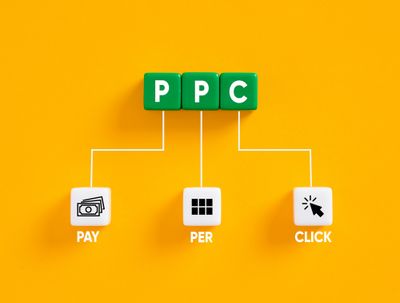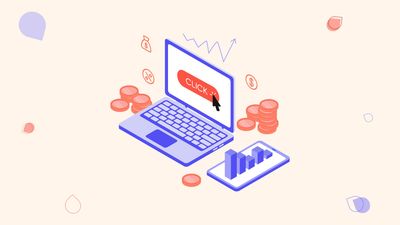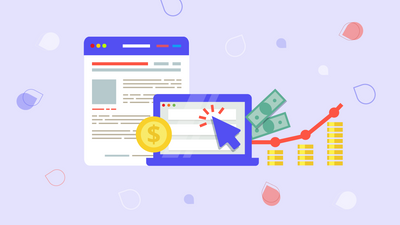Paid Advertising
Explore trend predictions, expert-recommended strategies, and comprehensive guides covering the full spectrum of paid advertising, from clicks to conversion. Access the resources you need to help you maximize your brand reach, drive business growth, and increase your revenue.
Digital Marketing10 Best Advertising Agencies in 2024Let's face it: every business owner wants to take their campaigns to new heights, achieve stellar ROAS, and get the most out of their investment. Working with the right advertising agency can make all these aspirations a reality. Whether you're a marketing director or a business owner, our pick of the best advertising agencies can help you find a reliable partner to build and further enhance your marketing efforts in 2024.
Our top picks for the best advertising agencies
1. Social Kick - Best overall
2. Octopus - Best for B2B advertising strategies
3. Replug - Best for mobile app marketing
4. Result Kitchen - Best for data-driven growth
5. Novi Digital - Best SEO & PPC services
6. Left Coast Agency - Best for growth marketing solutions
7. Bowler Works - Best all-in-one marketing solution
8. Moburst - Best for mobile and app marketing
9. MindAd Media - Best for marketing and sales strategies
10. Zonder Marketing - Best for performance marketing solutions
What is an advertising agency?
A digital advertising agency is a business that is dedicated to creating, planning, and handling advertising for its clients. Digital agencies often offer creative services such as graphic design and video production; they're involved in content creation and copywriting to create the ads. And then they also manage the technical setup and ongoing optimization of the advertising campaigns. It's like a digital marketing agency but just more specialized.
Why work with an advertising agency?
Digital advertising blew up in the last decade with the rise of social media platforms and new ad formats. This digital transformation in the advertising space has created a knowledge gap for business owners who want to scale their advertising efforts. Each platform has its own algorithm and rules, and it's tough to master any particular channel for a business owner or an in-house team.
Hiring advertising experts in-house is a very costly proposition and often takes much more time to train and determine if they are a good fit than when working with an agency. Creative agencies usually have a team of graphic designers and copywriters on staff. You could also hire them for some consulting work to just look at your overall strategy and suggest specific tactics you should work on.
Types of advertising agencies
There are 3 main types of advertising agencies that you should know about:
1. Creative agencies
Creative agencies are focused on the design of your ads and your overall brand. They often offer branding services such as creating your branding strategy and enhancing your site and social media pages with creative branding assets, very similar to a branding agency.
2. Social media advertising agencies
Another type of advertising agency focuses on social media ads because there are so many different platforms. And each one requires its own expertise. For example. some agencies only focus on one channel, like Facebook Ads, while others work with several channels. Some of the largest advertising agencies struggle to assemble a team of experts knowledgeable enough in all the variety of social media platforms that are used today.
3. Full-service advertising agencies
The full-service agency offers all the various digital advertising services—from copywriting to designing user experiences and managing the campaigns and the advertising budget.
What does an advertising agency cost?
Most advertising agencies charge a management fee that is a percentage of the marketing budget (or marketing spend). On average, a typical management fee is between 15% and 30%. At Mayple, the agencies that we would match you with charge around 10%, and that number goes down as the marketing spend increases.
Who should use an advertising agency?
Marketing directors or managers who don't have the right expertise on their team for specific digital platforms. It could also be business owners who require digital advertising services or a new digital strategy.
What are the four types of advertising?
Advertising in periodicals and journals is a thing of the past. Digital advertising is where most of the world's biggest names play. There are several types of online advertising services that an advertising company would offer for both B2C and B2B clients, namely:
Display advertising - usually referred to as banner advertising, it is when a business places a banner on a blog, website, or search page. They are either horizontal or vertical banners and are mostly visual, with very little text.Video advertising - video ads are eye-catching, entertaining, and great for telling a story. They're used in social media marketing on channels like Facebook Ads and on video sites like YouTube. Video ads are great for a brand awareness campaign.Mobile advertising - this is any ad that's displayed on mobile devices and includes a wide range of options like video, display, banner, search, and social ads. Mobile marketing is a huge area of advertising, and it will only get bigger and more impactful as time goes on.Native advertising - this is when an ad is integrated into a piece of content. It could be on an online publisher site or a blog. These ads are considered less disruptive because they usually match the style and flow of the piece.
What are the five roles of an advertising agency?
I know what you're thinking—who am I going to actually be working with? And you're right. It could get pretty confusing. There could be a wide range of roles at an advertising agency. Here are the main ones you should know about:
1. Copywriter
First and foremost, every good agency (even if it's a boutique agency) needs to have a good ad copywriter. That's the person who writes the copy for all the ads and landing pages.
2. Media planner / digital strategist
The media buyer or planner is in charge of setting up each advertising campaign, the audience tracking, and managing things on a daily or weekly basis. They could also do creative strategy as well.
3. Social media expert
You guessed it! Every advertising agency needs a social media marketing expert on the team. They should know how to create content for each platform and how to increase engagement and grow followers.
4. Graphic designer
A graphic designer is someone who will be creating the designs for your ads. That could include doing animations, creating videos, and doing touchups on your ads. It's like having your own design firm.
5. Website designer
What's a web designer for? For coding the landing pages, if you have specific ones you use for your advertising campaigns.
Top experts10 Best Paid Advertising Agencies in 2024Let's be honest; paid advertising is often at the heart of any thriving marketing strategy. But, to stay ahead of the competition, you must partner with the best and leverage their experience and expertise to your advantage.
Here are the top 10 paid advertising agencies renowned for driving targeted traffic, maximizing ROI, and crafting innovative campaigns that set new industry standards.
Our top picks for the best paid advertising agencies
1. Cedarwood Digital - Best overall
2. Common Ground - Best for personalized ad management
3. Tale Digital - Best for results-focused online marketing
4. ThinkSocial.Media - Best for strategic digital marketing services
5. AdCore - Best for performance-driven PPC advertising
6. Sortino Marketing - Best for results-oriented SEO marketing
7. 360 Om - Best for customer-focused paid social advertising
8. Pixated - Best for specialist Facebook and Instagram advertising
9. Sensters - Best for results-oriented digital marketing
10. SEM Booster - Best for in-depth SEM marketing
What is a paid advertising agency?
Paid advertising agencies, also known as PPC or SEM agencies, specialize in creating and managing online ad campaigns targeting a broad audience. They excel at crafting compelling ad content, optimizing budgets, and maximizing ROI.
In essence, a paid advertising agency is a strategic partner for businesses looking to enhance their online presence and generate leads through various online advertising strategies. These strategies encompass platforms like Google Ads, social media advertising, and more, with the ultimate goal of increasing brand visibility and revenue through well-executed ad campaigns.
What do paid advertising companies do?
Paid advertising companies help businesses manage their paid campaigns on various platforms, including Google Ads, Facebook Ads, and Google Shopping, to name a few. They could also have experience in organic search (search engine optimization) and social media marketing. Most importantly, they help you reach potential customers and hit your business objectives.
Is paid advertising worth it?
Online paid advertising is extremely valuable as it helps businesses generate traffic, increase leads, boost brand awareness, and hit business goals. Advertising campaigns can vary across different social media platforms and online marketplaces.
Most importantly, it's a very efficient digital marketing strategy that helps businesses reach their target audience and acquire relevant traffic. Some business owners set up their own advertising campaigns, while others use a digital marketing agency or a specialized advertising agency to manage the campaigns for them.
What is the biggest form of advertising?
The biggest form of advertising is Google Ads. It takes a variety of forms, including Google Shopping, traditional Google Ad campaigns (Google Adwords), native advertising, and programmatic ads.
The second biggest is by far all the various social media ads, which include:
Facebook AdsInstagram AdsPinterest AdsTikTok AdsTwitter AdsLinkedIn AdsSnapchat Ads
Why should you use a paid advertising company to handle your campaigns?
There are so many benefits of using a digital agency to manage your advertising campaigns. Here are a few of the top ones:
Niche-specific expertise
Most ad management companies have specific expertise in particular niches. For example, through Mayple, you can find an ad management agency that has worked with other brands in your niche and has advertised similar products. If you're a shoe company, you want to work with PPC experts who know apparel like the back of their hand.
Thorough knowledge of trends
Professional digital marketing companies stay current with all the latest trends and ever-changing advertising tactics. They can use a wide range of techniques to improve your marketing campaigns.
Proven experience
An experienced advertising agency knows the type of advertising campaigns you should launch and the best tactics to optimize them. They know how to improve your conversion rate to get you more clicks, which keywords you need to use, and how to attract high-converting customers.
How to choose the best online advertising company for your business
Ask about their portfolio and results
Ask them which businesses they've worked with and what kind of results they've gotten. Always base your decisions on data; don't rely on their fancy reviews, sales pitches, or slide decks. Make sure to see the type of campaigns they've managed in the past.
Make sure they have experience in your niche
Make sure that they've worked with similar businesses in your niche and that they know the type of audience you're targeting. They don't need to have decades of experience, but having industry experience is super important.
Get a marketing plan
It's always a good idea to give the PPC agency you're interviewing a test assignment. We would recommend having them write out a marketing plan for your account. Have them outline some of the advertising strategies they would use for your business, how they plan to improve your conversion rate, and how they plan to better match the offer with the needs of your prospective customers.
Questions to ask your paid advertising company
How many clients do you have?What other digital marketing services do you offer? How will you help us meet our marketing goals? Which advertising platforms are you most experienced in? Which type of ads are you most familiar with? Google Ads? Google Shopping? Facebook Ads?What would you change in our landing pages, creatives, and copy?What type of growth do you see us hitting in the next 3 to 6 months?How big is your marketing team?Who will be our point of contact?
How much do paid advertising companies charge?
Advertising companies charge based on the range of services they offer. Usually, it's a fixed fee plus the advertising spend (which is paid to the particular advertising platform they're using). If you need a consultation, then they would charge you an hourly rate or a consultation fee.
HireTop 10 Google Ads Experts to Hire in 2024In 2022, people in the U.S. spent an average of 8 hours and 14 minutes daily on digital media, with Google being the main entry point for most of this content. This underscores the importance for businesses to not just establish an online presence but also leverage online advertising to ensure visibility. Explore our curated list of trusted Google Ads experts for expert guidance in optimizing your online advertising strategy.
» Not sure how Google Ads work? Check out this short Google Ads guide.
Our top picks for the best Google Ads experts
1. Skarlet R. - Best overall
2. James R.- Best for brand presence on Google Ads
3. Angel M.- Best for tailored Google marketing techniques
4. Brielle C.- Best for fresh Google marketing strategies
5. Cree J.- Best for combining Google Ads with influencer marketing
6. Phil D.- Best for growing a social following
7. Jessica S.- Best for targeting wellness, health, fitness and outdoors
8. Rachel M.- Best for the cosmetics and fashion industry
9. Courtney E.- Best for handling Google Ads mixed with SMM
10. LaNell A.- Best for development and fintech
What is a Google Ads expert?
A Google Ads expert specializes in creating, managing, and optimizing advertising campaigns on Google's platform. They craft targeted ads using keywords, demographics, and budgets to maximize a business's online visibility. They continually analyze data, adjust strategies, and utilize various ad formats (text, display, video) to drive traffic, conversions, and revenue for businesses aiming to reach their target audience on Google's vast network.
Why hire a Google Ads expert?
There are many reasons to hire a Google Ads expert to help manage your ad campaigns for you. For one, ad strategies and trends are constantly changing, and you need an expert knowledgeable in what works in your particular industry or niche. They need to know how to optimize your quality score, which bidding strategies to use, and which keywords to target.
A Google Ads manager also brings expertise in maximizing ad spend efficiency. They know how to navigate complexities within Google Ads, target specific demographics, optimize keywords, and craft compelling ad copy.
They'll fine-tune your campaigns for optimal performance, stay abreast of the latest trends, and adapt your strategies to the ever-evolving algorithms. Ultimately, their expertise will save you time and resources, as their knowledge reduces trial and error, ensuring campaigns align with business goals while improving ROI.
» Learn how to calculate and maximize your ROI.
Staying on top of the Google Ads game
Follow these helpful and practical tips to maximize your Google Ads results:
Continuous learning: Stay updated with Google's updates, new features, and best practices through courses, blogs, and certifications.Brilliant campaign structuring: Organize your campaigns with clear goals, tight ad groups, relevant keywords, and compelling ad copy.Keyword optimization: Regularly review and refine keywords, adding negatives and leveraging match types for precision.Conversion tracking: Implement and monitor conversion tracking to accurately assess campaign success and ROI.Audience targeting: Utilize audience targeting features to reach specific demographics and retarget past visitors.Ad extensions: Maximize visibility and engagement by using ad extensions strategically.Performance analysis: Analyze data regularly to identify trends, make data-driven decisions, and optimize campaigns effectively.
With all this in mind, a Google Ads manager can make your marketing strategy that much easier and more efficient with their expertise in the industry.
Hire a Google Ads expert with data-backed results
Choosing the right Google Ads expert can be tricky, especially with all the flashy sales pitches and conflicting reviews out there. That's where Mayple steps in, offering a smart solution by connecting you with proven Google Ads pros.
From its early days as "AdWords" to today's sophisticated Google Ads platform with machine learning and responsive search ads, Mayple ensures businesses get the expertise they need for impactful and targeted advertising. In a rapidly changing digital world, Mayple is the trusted partner for businesses looking to make the most of their online advertising game.
PPC7 Key PPC Trends That Will Supercharge Your Advertising Efforts in 2024Dating back to the late 1990s, PPC (pay-per-click) has seen some massive transformations as it's grown into a $60 billion market in the US alone. But for brands just dipping in their toes, the level of competition can be intimidating. That's why we discuss below the importance of PPC in digital marketing and how to stay competitive by keeping up with evolving trends.
7 key PPC digital marketing trends you need to be aware of
Shifting consumer behaviorsAutomation and AIMobile-centric optimizationVideo advertisingeCommerce salesVoice search and smart devicesMultichannel attribution
1. Shifting consumer behaviors and PPC strategies
As with any area of business, it's non-negotiable to stay on top of consumer behaviors and how those shifting behaviors impact the way you've been doing things. In the PPC world, we've seen two big changes spurred by consumer behaviors:
Consumers are more skeptical of ads, which has drastically boosted the number of ad-blockers in use.Consumers are demanding more authentic, personalized experiences.
For advertisers, this translates into a growing need for carefully crafted ads that provide genuine value, resonate with the individual interests of each user, and seamlessly blend into their user experience.
» Meet consumer demands better by improving your market segmentation.
2. Rise of automation and AI in PPC marketing
The impact of automation and AI technologies on PPC is nothing short of transformative. Tools like ChatGPT can sift through vast data sets to enhance targeting, making it easier for marketers to identify which PPC keywords resonate with their audience.
On the bidding front, artificial intelligence and machine learning tools can autonomously adjust PPC bids to connect you with qualified leads without sacrificing ROI. Further, AI can tailor ads based on user behavior and optimize delivery timing, ensuring relevance without overwhelming the audience.
Navigating privacy concerns in automated PPC
User privacy has long been a hot-button issue in online advertising, and AI tools are intensify these concerns. AI relies heavily on collecting and analyzing vast amounts of user data, which raises the risks of data misuse or unauthorized access. To navigate these concerns, consider being transparent about data collection and obtain explicit user consent before creating an automated PPC campaign.
AI-powered PPC management platforms
Harnessing PPC automation tools and AI-driven platforms is essential for success in digital marketing. These tools streamline campaigns, offering advanced automation, data-driven insights, and bid adjustments for optimal results. They empower advertisers to navigate PPC complexities, enhancing targeting, identifying top-performing keywords, and delivering tailored ad content based on user behavior while maintaining ROI.
3. Mobile-centric PPC optimization
Every passing day, more and more customers are shopping on their mobile devices like smartphones and tablets. Advertisers need to keep this in mind, crafting ads that are visually effective on desktop and the varying shapes and sizes of users' mobile screens. Try:
Focusing on ad copy that's concise and descriptive, highlighting the most important messaging quickly and effectively.Avoiding small text that can be hard to read on a smaller screen.Using eye-catching images and larger text when it's needed.
4. Leveraging video advertising in PPC
Video is all the rage in recent years, which explains why PPC video advertising has also shot up. Video consistently proves itself to be one of the most captivating and engaging content formats, with video ads being prevalent on platforms like YouTube and Facebook. While any brand can see success, video advertising tends to be more common in industries like fashion and beauty, which are heavily focused on aesthetics. To create impactful video ads on a budget, consider:
Leveraging user-generated content, where you repurpose video content created by your customers and followers.Taking advantage of free or inexpensive editing software.Shooting videos using a smartphone.
5. PPC's role in driving eCommerce sales
PPC plays a pivotal role in driving eCommerce sales, forming a symbiotic relationship that benefits both. eCommerce relies on PPC to attract potential customers who are actively searching for products, and PPC thrives on eCommerce to convert those clicks into sales. To make sure your ads are effective, consider best practices like:
Prioritizing long-tail keywords that reflect narrow, specific user intent.Crafting compelling ad copy that not only showcases your products but also highlights unique selling propositions and promotions.Use engaging visuals that highlight the strengths and aesthetics of your products.
6. Adapting to voice search and smart devices
Typing is becoming overshadowed by voice search and smart devices. This signals a significant shift in things like keyword usage, as a voice search is much different in nature.
While text searches tend to be less natural and focus on the most important nouns and adjectives, voice search is more conversational and in line with the way we talk.
For PPC ads, advertisers should focus more on natural, long-tail keywords and display voice-friendly and concise answers that give users information quickly and seamlessly.
7. Navigating multichannel attribution in PPC
Today's users will often engage with a brand on several channels before making a purchase. For example, they may click a PPC ad in a Google search result on their phone, browse the website, and sign up for the newsletter. Then, days later, they visit the company's Facebook page on their phone and browse a sale that's been promoted in a post. Then, even later, browse again in a newsletter promotion and finally make a purchase on their desktop.
To address this, consider advanced tools like Google Analytics 360 and marketing automation platforms. They can help you set up attribution models that provide a comprehensive view of the customer journey and attribute conversions accurately to the right channels and touchpoints.
Crafting your strategy amidst shifting trends
As an advertiser, it's critical for you to keep on top of shifting marketing trends so you can stay competitive and successful. Consider all the insights and tips we've discussed today, including shifting consumer behaviors and strategies, the rise of automation and AI, mobile-centricity, video advertising, eCommerce sales, voice search and smart devices, and multichannel attribution. They can help to inform your PPC campaigns, allowing you to achieve better results in today's dynamic digital marketing landscape.
However, while these AI-powered platforms are invaluable, finding the right PPC expert who can leverage these tools effectively is equally important. This is where our platform comes in. We are a marketplace and platform dedicated to helping brands connect with highly vetted experts who possess proven experience in your specific niche.
Our unique approach considers over 50 factors and employs AI to match your brand with professionals who understand your industry inside and out. By partnering with our platform, you can tap into the expertise needed to maximize the potential of PPC automation tools and elevate your digital marketing efforts. Discover how Mayple can connect you with the perfect PPC expert for your business today.
PPCPPC vs. Display Ads Explained: Which Is Right for Your Business?Online advertising can be a quick and powerful way to boost your digital presence—up to 80%. Plus, certain online ads can improve your conversions by 59%, especially when people search for your business after seeing those advertisements.
Success depends on choosing the right ad format based on your target audience and business goals. The two main options available to you are pay-per-click (PPC) and display ads. PPC ads can be a strategic choice if you want to make immediate sales, while display ads are ideal for creating a lasting brand presence and gaining recognition over time.
In this post, we'll highlight the key differences between PPC and display ads so you can make an informed choice for your business.
Fundamental differences and examples
Below, we explore the main differences between PPC vs display ads, including what they look like and how they're used.
PPC ads
PPC ads are a way for businesses to show ads online and pay only when someone clicks on their ad. This makes PPC ads staples in search engine results like those on Google and social media feeds on platforms like Facebook. PPC ads are a popular and effective way to reach potential customers who are actively searching for products or services related to what the business offers.
For example, a search engine PPC ad should be well-crafted to grab the attention of potential customers, provide relevant information, and entice them to click on the ad. Joes Beauty achieves this by clearly showing:
The product's name and brandValue to the customer (unbeatable pricing + fast shipping)Other product categories the customer may be interested in
In comparison, Facebook PPC ads need to be highly visual. Social media is synonymous with high-quality images, so successful Facebook PPC ads need to stand out from the competition and catch the target audience's eye. Comic Warehouse achieves this with their Facebook PPC ads by:
Letting product images take up most of the ad spaceIncorporating a carousel to promote more than one product in a single adAdding simple 'Shop Now' buttons underneath each image
Display ads
Display ads are like online billboards or posters that you see while browsing websites, reading articles, or using apps on the internet. You'll spot these as banners, sidebars, or even pop-ups on various desktop and mobile sites. They're meant to catch your eye with visuals such as images, graphics, or videos. These ads aim for long-term brand recognition and usually charge based on how often they're viewed, not clicked.
For example, this display ad banner pops up in one of Simone Walsh's blog posts. Its copy is clear and to the point, while the image tries to connect to the customer emotionally.
The main difference between PPC vs display ads is that PPC ads appear during active searches, while display ads appear during casual browsing.
Aligning advertising goals and budget allocation
Deciding how much money to allocate to PPC ads vs. display ads can feel like walking a tightrope. PPC ads deliver quick leads and immediate results—yet come at a higher price per click. Display ads cost less and help create awareness and visual impact, albeit with a longer wait for ROI.
So how do you decide? The key is to align your budget with your goals. Suppose you have $5,000 to spend with the goal of acquiring 200 new customers this month. Then, you'd do well to allocate 70%-80% to PPC since it can provide you with quick, targeted results. The remaining 20%-30% can go into display ads, which are effective for long-term brand building.
Audience targeting and testing
PPC and display ads differ significantly when it comes to audience targeting. PPC ads zero in on people through keyword relevance and search intent. Display ads, meanwhile, target broader groups based on interests and demographics.
To make the most of audience targeting, you need to focus on specific details. For PPC campaigns, this means harnessing search intent and demographic factors. For display ads, align your campaign with specific interests and popular websites.
And don't forget to regularly test and refine your campaigns for the best results. Here are some strategies to consider:
A/B test ad copy to identify the most persuasive messagesVary landing pages to discover the best user journeyTweak visuals to figure out what engages your audience the most
Based on the results, you can fine-tune your strategies to optimize performance across both PPC and display ads.
Designing engaging ad content and measuring performance
The impact of compelling ad content cannot be overstated. In a crowded internet landscape, engaging ad content can be the difference between a fleeting glance and a meaningful customer interaction.
Both PPC and display ads allow you to run ad content, but each requires a distinct approach for optimal results.
For PPC campaigns:
Keep copy concise and focusedUse a compelling call to actionIncorporate dynamic elements like videos to elevate engagement
For display ad campaigns:
Use visually captivating images to grab attentionIncorporate storytelling to engage viewers and convey your message effectively
Once you apply these tips, keep a close eye on particular metrics to see how well you're doing.
For PPC, watch your Quality Score, click-through rate, and conversion rate. These numbers reveal how engaging your ad is and how often it turns clicks into actions.
For display ads, focus on viewability, total impressions, and engagement rate. These tell you how often your ad actually gets seen and interacts with your audience.
By regularly monitoring the performance of your ads, you learn what's working and where adjustments can be made.
» Here are some helpful tips to help you nail your ad creatives
Optimize your advertising strategy with Mayple
While considering the merits of PPC and display ads for your business, you might find value in a specialized guiding hand. That's where Mayple—a comprehensive platform for managing paid search campaigns—comes in.
Mayple combines industry expertise with advanced tools to help businesses achieve their advertising goals. Our PPC experts have a proven track record in optimizing PPC and display ad campaigns for hundreds of brands, and they can help you align with the strategies discussed in this article.
Platforms and scenarios
PPC and display ads each have their native territories where they shine brightest. PPC ads usually dominate search engine results, primarily through platforms like Google Ads. If you're aiming to target users based on specific search intent, Google Ads often provide the highest chance for immediate conversions.
On the flip side, display ads find their home on social media feeds and various websites. They excel at building brand awareness over time. If you're looking to capture attention and target broader audiences based on interests or demographics, display ads on social media platforms are the way to go.
Both ad types offer unique advantages depending on the platform and the goals you aim to achieve, making a clear case for diversifying your advertising strategy.
Crafting your digital ad strategy
The benefit of digital advertising is its ability to deliver measurable results quickly. If immediate conversions are your priority, using PPC for business is a no-brainer. On the other hand, display ads provide the visibility you need for long-term brand building. Platforms like Mayple can help fine-tune your strategy to ensure you're using your budget effectively.
» Want to learn more about PPC ads? Get all the answers in these expert-approved books
PPCChoosing the Right PPC Agency for Your eCommerce Business: 6 Key FactorsSearch ad spending has seen predictable year-on-year growth and is only expected to continue the trend. Data from eMarketer shows that the search ad industry hit $99 billion in 2022 and is expected to grow to $136 billion by 2026. This continuous growth trajectory is no surprise: when done right, digital advertising continues to be one of the highest-performing strategies for brand growth.
So how can you be one of the brands that's doing it right? It all starts with learning how to choose a PPC agency that gets the job done well. In this article, we'll look at how you can find the best PPC agency for your growing business.
6 key factors to help you choose the right PPC agency
Industry experience and expertiseTrack record and success storiesTransparency and communicationCustomization and strategyData analysis and optimizationBudget management and ROI
1. Industry experience and expertise
First things first: your agency needs to know what they're doing, and this is best measured by their experience and expertise with running PPC campaigns in your industry. Each industry will have its own unique considerations and requirements—a campaign in the finance industry generally won't have the same best practices as one in the eCommerce beauty industry.
Industry expertise will help agencies navigate the nuances of each market, better understand competitors and audiences, and choose the most effective keywords, campaign settings, and strategies.
» Here are the best Google ads bidding strategies.
2. Track record and success stories
To get a better idea of an agency's industry expertise, as well as their overall ability to build and manage successful PPC campaigns, look for things like a portfolio, case studies, and client examples. These types of documents can show whether the agency has a demonstrated track record of success for previous clients. You may be able to find case studies on their website or social media. If not, just ask them directly.
3. Transparency and communication
You need to be able to trust your PPC agency. You also need to know what's happening in your campaigns and be able to have an active voice in the daily decisions. This is why transparency and strong, clear communication are critical when looking for the right PPC agency.
They should provide you with regular updates and comprehensive reporting so you always know how your campaigns are going. To figure out the communication style of a potential agency, ask them questions like:
How they communicate with clients (email, phone, video calls, etc.)How often they communicate with the average clientHow often they send reports and updatesHow they handle unexpected issues and client inquiriesWho your point(s) of contact will be, and their position at the agency
» Here's how to calculate and improve your PPC conversion rate.
Consider Mayple for your PPC needs
Want to make sure you choose an excellent PPC agency the first time around? Mayple was designed to help eCommerce business owners and managers like you connect with PPC agencies and other marketing experts. Mayple ensures that you have access to high-quality agencies with experience in your industry and niche. With data-based vetting and AI-powered matching, you can be sure you're in safe hands.
4. Customization and strategy
Like any other marketing strategy (or any business strategy, for that matter), a one-size-fits-all approach won't work for PPC campaigns. Every eCommerce brand will have its unique circumstances, including needs, goals, audience, industry conditions, competition, budget, obstacles, and more.
That's why your PPC strategy should be customized to where you are and where you want to be. One of the key ways you can tell if you'll get a high-quality, customized PPC strategy is to pay attention during consultations and negotiations. Are they taking the time to really understand your business, goals, and market? Are they showing their knowledge of nuanced business strategies and providing insights into what they might recommend if you sign on as a client? If so, you may be on the right track.
» Find out how to audit your PPC ads like a pro.
5. Data analysis and optimization
It's one thing to build a solid initial campaign, but it's a completely different ballgame to continuously analyze and optimize it for the long haul. The best PPC agencies put a high value on data collection and analysis so they can make data-informed decisions about what to do next. In an ideal scenario, this optimization is running constantly in the background, with the agency making tweaks and changes on a regular basis—even weekly or monthly.
When interviewing PPC agencies, ask them about their analysis and optimization approach. How often do they review campaigns and implement optimizations? What KPIs (key performance indicators) and metrics are they tracking? What tools, platforms, and practices do they use? At the very least, they should be using Google Ads built-in analytics if they're running campaigns on Google Ads.
» Check out our list of the top PPC platforms.
6. Budget management and ROI
Effective budget management is a non-negotiable when it comes to PPC campaigns. An agency that knows its stuff can calibrate your bids just right, aligning them with the real value they bring to your business.
It's not just about saving money but making each dollar work as hard as possible for you. To guide your budget conversations with potential agencies:
Clearly indicate your budget limits and ask the agency how they will manage within those confines to achieve your goals.Request a detailed plan on how the agency proposes to allocate your budget across different PPC elements like keywords, ad placements, and targeting options.Inquire about the agency's fallback strategies for situations where budgets overshoot or underperform.
» Learn how to get the most out of your budget by reading these PPC books.
Closing in on the perfect PPC agency
Choosing the right PPC agency is a crucial step toward eCommerce success. Now you have a comprehensive guide to help you on your journey to choosing the right one. Remember to look carefully at the factors we've discussed, including industry experience, proven track record, transparency and communication, customization and strategy, data analysis and optimization, and budget management and ROI. Weight them out with your specific needs and goals.
Don't forget to explore Mayple as an additional resource—it can save you tons of time and headaches when it comes to connecting with the right PPC experts.
» Looking to further grow your wins? Check out this guide on how to find PPC keyword ideas.
PPCHow to Use PPC With Your Inbound Marketing StrategyPPC, short for pay-per-click advertising, has reshaped the digital marketing scene. It's like the evolved version of the old-school Cost Per Mille (CPM) model, where advertisers footed the bill for every 1,000 impressions. With PPC, you're putting your money on real results: clicks, leads, or installations.
Now, the big question is: How do you make your PPC efforts sustainable?
Enter inbound marketing. This marketing strategy is customer-centric and aims to provide value throughout the buyer's journey, ultimately leading to long-term customer relationships and business growth. Below, we explore how to effectively incorporate PPC with your inbound marketing strategy.
Meet the expert
Gilad Bechar, the founder of Moburst. In just three years, he established industry leadership which garnered acclaim from Google for his innovative and holistic growth services. He took a moment from his busy schedule to give us insider tips on which metric to keep an eye on.
Inbound vs outbound marketing: What’s the difference?
The main difference between inbound and outbound marketing lies in how they attract audiences.
Inbound marketing
Here, you pull people towards your content, be it on your website, social media, or email newsletters. It’s tailored for audiences who naturally find their way to you. They’ve interacted with your content or visited your website, and maybe you've even nudged them with remarketing ads to remind them you're still there. Outbound marketing
This proactive strategy helps you actively reach out to your target audience through various channels like PPC and influencer marketing. It spans the entire funnel, from raising awareness and reaching new audiences to converting them into customers.
» Read our interview with HubSpot's Dan Tyre on inbound marketing strategies for eCommerce
PPC and inbound marketing: Are they true allies?
You can think of PPC as a hybrid marketing strategy that neatly straddles both inbound and outbound marketing. On the outbound marketing side, PPC can be a more aggressive strategy because your target audience can't help but see your paid ads online, whether it's on social media, banners, or display ads.
However, PPC ads are remarkedly flexible and data-driven—these are the qualities that make them compatible with inbound marketing. Because you specifically pay for certain keywords associated with your ad, your customers first have to search for those keywords to come across it.
By requiring your customers to take the first step and initiate their interaction with your brand, you're pulling them towards you instead of shouting into the digital abyss. Plus, because these customers are using search queries that match your keywords, they're already looking for the solution you're providing, improving your chances of conversion.
How to incorporate PPC into your inbound marketing strategy
Incorporating PPC into your inbound marketing strategy is a comprehensive process that involves understanding your entire sales funnel. It’s about nurturing interested users, keeping them engaged, and gradually leading them to become clients.
Work in tandem: Draw organic leads with inbound strategies and generate demand with PPC
Inbound marketing and PPC can be an efficient tag team where inbound marketing focuses on drawing in customers over the long term, while PPC gives your inbound marketing strategy the initial boost it needs to get going.
For example, you can use inbound marketing to gain subscribers across social channels, email newsletters, and app notifications. You want to continuously engage with this audience until they’re ready for a bigger commitment by providing value through tips, case studies, and success stories tailored to their needs.
At the same time, your PPC campaign can build interest and awareness. You can repurpose your inbound content and create ads, calls to action, and hooks to attract potential leads into your inbound pool. Staple platforms to advertise on include Facebook, Google, or offline channels.
The further you guide paid leads into the funnel, the better your chances of impacting and converting them.
Make keywords work for you
PPC and inbound marketing both rely on effective keyword research. When you run PPC campaigns, you gain insights into which keywords are driving traffic and conversions. You can use this data to optimize your inbound content strategy. You can run A/B tests of ad copy, landing pages, and calls-to-action to create valuable content around those keywords and attract organic traffic over time.
» Here's how to find great PPC keyword ideas
Stick to best practices
Whether you're promoting products or services, or operating within whichever industry, there are core best practices to keep in mind to make sure your marketing efforts remain consistent:
Align your brand message: To give your audience a unified experience, make sure the messaging in your PPC ads is the same as your content and landing pages they lead to.Optimize your landing pages: Create landing pages that are optimized for conversion, including clear calls-to-action, relevant content, and a user-friendly design.Track your conversions: This will help you measure the impact of your PPC campaigns on your inbound marketing goals, such as lead generation or content downloads.Manage your budget: Carefully manage your PPC budget to align with your overall marketing strategy. Your PPC investment should balance with the long-term benefits of inbound marketing.Keep monitoring your marketing efforts: Regularly monitor and analyze the performance of your PPC campaigns and inbound marketing efforts. Make data-driven decisions to optimize both strategies over time.
» Need help bringing PPC and inbound marketing together? Contact a top PPC expert
How a SaaS company can use PPC with inbound marketing
Scenario: A SaaS company offering project management software wants to use PPC and inbound marketing in conjunction. They already have a well-established inbound marketing strategy in place, including a blog with informative articles about project management best practices, templates, and resources. Now, they want to attract and convert businesses looking for project management solutions.
1. Conduct keyword research
They start by conducting keyword research to identify relevant search terms. This includes:
cloud-based project management softwarecollaborative project management toolsproject management software reviews
2. Create targeted landing pages
They create dedicated landing pages on their website that provide in-depth information about their project management software's features, benefits, and how it solves common project management challenges. Each landing page is optimized for one or more of these high-performing keywords.
3. Drive traffic to landing pages
They set up PPC campaigns (Google Ads) with ad groups focused on their chosen keywords. These ads highlight the unique selling points of their software.
When users click on the ads, they're directed to the relevant landing pages where they can access detailed information, downloadable resources (such as eBooks or case studies), and clear calls-to-action (CTAs) encouraging them to sign up for a free trial or subscribe to a newsletter.
For any users that didn't immediately convert, the company runs remarketing campaigns to remind the users of the software's benefits and features. Plus, they encourage the users to return and take the desired action.
4. Integrate PPC with inbound marketing
As users engage with their inbound content (e.g., blog posts about project management tips), they use PPC to promote relevant pieces of content to a broader audience. For example, creating PPC ads that drive traffic to blog posts on "Effective Team Collaboration in Project Management."
5. Track and optimize performance
The company continuously monitors the performance of their PPC campaigns by tracking analytics like click-through rates, conversion rates, and cost per acquisition. This helps them to make data-driven decisions, including allocating more resources to well-performing keywords or ad creatives and adjusting or stopping underperforming ones.
» Want to reach a vetted PPC expert? We can help
PPC and inbound marketing: A powerful combination
PPC advertising, a results-oriented outbound strategy, and inbound marketing, a customer-centric approach, can synergize for digital marketing success. PPC's immediate impact and data-driven nature make it a valuable component within inbound marketing. It acts as a bridge, attracting attention and generating leads, while inbound strategies nurture and build lasting relationships.
Keyword research from PPC informs content optimization, creating a unified brand experience. Combining both tactics, you can have the best of both worlds, propelling your brand towards growth and sustainability in the digital landscape.
PPCHow to Make Money With PPC Affiliate Marketing: Learn From an ExpertPPC affiliate marketing is an overlap of affiliate marketing and PPC marketing strategies. The US affiliate marketing industry as a whole is a rapidly growing one. In 2021, it clocked in at $9.1 billion, up from $6.2 billion in 2018. So naturally, PPC affiliate marketing can be a great way to generate income for those who do their research and develop a well-thought-out approach.
If you're looking for a guide to PPC affiliate marketing for beginners, you're in the right place. I'll be sharing some "behind-the-scenes" tips and considerations from my own decade of experience running all three of these types of marketing campaigns.
» This is how you create effective PPC ads
The foundation: Niche selection and keyword strategy
To make it in PPC affiliate marketing, you'll need to hit the ground running with a successful niche. The right niche will have an active and engaged target audience, with relevance and demand for the products or services you're promoting. A high demand equals high potential for profitability and minimal losses from your upfront investment.
As for keywords, they're are the lifeblood of your campaigns, since they determine where and when your ads appear. The secret sauce here is to strike a balance between high-volume general keywords and lower-volume keywords that are more specific, like long-tail keywords. With long-tail keywords, you may have less overall traffic, but those users may be more ready to buy than the users you attract with general keywords.
» Looking for innovative ways to find PPC keyword ideas?
Crafting effective landing pages and campaign optimization
Landing pages are critical: they're often the difference between another passing visitor and a converting customer. Here's a "recipe" that I use when I'm developing my own landing pages:
An eye-catching headline that speaks directly to the needs, wants, and behaviors of your target audience.Engaging visuals that ideally showcase or emphasize the product or service you're promoting.Persuasive, concise, and visually separated copy—no long, rambling blocks of text.A clear, captivating call-to-action (CTA) that tells them exactly what to do next and how to do it.Minimize distractions and utilize white space and sectioning to guide users down the page.Make sure it's all responsive across any device, as many users will come through mobile.
You'll also need to keep optimizing as you go. Continuously review and update your keyword lists, ad copy, bidding strategies, and landing pages as you get feedback and data on which ones work and which ones don't. Managing multiple campaigns can make it tough to prioritize your adjustments, so start with the highest-impact ones. Your performance metrics will make these clear to you as they come up.
» Check out these expert tips on FB ad bidding strategies
Quality Score, ad ranking, and budgeting
Quality Score is a metric that's used by PPC platforms like Google Ads to rate the relevance and quality of different aspects of your campaigns, like keywords, ads, and landing pages.
As you might imagine, low Quality Scores tend to translate to lower rankings and higher cost per click (CPC), which can lead to poorer (and more expensive) performance in the long run.
To maintain and raise your Quality Scores, focus on things like keyword relevance, alignment of your copy with your keywords, and the quality of your landing page content. Regularly update and optimize to continuously improve.
Another consideration is budgeting. Make sure you're prioritizing the campaigns with the highest potential for return on investment (ROI), which have traits like higher Quality Scores, lower CPC, more clicks, and more conversions. But don't neglect the importance of testing and experimentation—without it, you'll never discover new, potentially better opportunities.
» Learn how to calculate and improve your PPC conversion rate
Leveraging Mayple: A partner for PPC success
If you're looking to streamline your PPC affiliate marketing efforts, consider a platform like Mayple. Mayple was designed to connect you with experts who can help build, manage, and optimize your campaigns for long-term success. You'll be able to find a specialist or agency that can help with all the things we've discussed here, like choosing the right niche, choosing your keywords, crafting landing pages, budget allocation, and more.
Hundreds of clients have seen affiliate marketing success through Mayple. For example, Glamnetic, an eCommerce brand selling magnetic eyelashes and press-on nails. After working with a Mayple expert, Glamnetic saw:New affiliate marketing partnerships that generated over 4,000 new customers per monthThe development of over 255 new affiliate partnershipsA new landing page, which generated a 1.8x increase in conversion rates
Achieving synergy: SEO and PPC integration
There's an interplay between search engine optimization (SEO) and PPC strategies. When you play your cards right, they can amplify your success.
For example, you can use PPC data to identify high-performing keywords, which can then be used to target the right organic keywords for your SEO strategy.
And in the other direction, strong SEO performance boosts your website's authority and trustworthiness both in the eyes of search engines and potential customers. This, in turn, can boost your PPC performance.
Marketing specialist Cody Bollerman was able to achieve this balance for a biotech client, boosting the company's online lead generation from $35 million to $83 million in just two years. He identified top converting keywords and ranked for them in Google. Over time, this led to higher authority in the eyes of Google, which earned the brand more organic keywords at no cost. He was then able to create new landing pages based on campaign performance.
» Find out how to audit your PPC ads like an expert
Adapting strategies for long-term success
When it comes to long-term success in PPC affiliate marketing, you must adapt or face the risk of falling behind. Factors such as rising competition and evolving consumer habits can turn once-profitable keywords ineffective and make high-converting landing pages lose their appeal. In such scenarios, flexibility is more than a virtue—it's a crucial component for maximizing ROI and keeping your campaigns strong.
Take Nikon as a case study in adaptability. Seeing a drop in consumer purchases, the company shifted focus. Instead of pushing cameras, they began championing the joy of photography. They created a space for a community, transforming passive viewers into engaged participants. By recalibrating their PPC strategy like Nikon, you keep your campaigns both relevant and successful.
»Don't miss these PPC platforms in 2023
Empower your affiliate journey with PPC excellence
If you approach your campaigns with a research-oriented, strategic mindset, you'll be one step closer to making money with PPC affiliate marketing. Just remember the tips we've discussed today, like choosing the right niche and keywords, building high-converting landing pages, marrying SEO and PPC, and adapting as you go.
If you're feeling a bit overwhelmed or would like some help, check out Mayple to connect with PPC affiliate marketing experts who can help make sure you see the results you're after.
PPCChatGPT Advertising: How to Write Good PPC Ads Using ChatGPT ScriptsPay-per-click (PPC) advertising plays a huge role in digital marketing. Being just one tactic in the search advertising realm, it's expected to hit a whopping $279 billion in 2023.
For nearly 20 years since the inception of PPC, brands have used it to boost their awareness and revenue. And now, as AI plays a growing role in transforming advertising strategies, it's also changing the way brands create their PPC ads.
» Back to basics: Try these master tips to start your PPC advertising strategy from scratch.
Leveraging ChatGPT in PPC advertising
More and more brands are realizing they can integrate ChatGPT advertising into their strategies without much effort. It boosts their campaign's impact, scalability, personalization, and efficiency.
For example, you have multiple customer segments, and you want to ensure each group sees the most relevant ads. ChatGPT can whip up a highly targeted copy for each group in seconds, shaving off critical time and resources for your team.
» Follow this essential guide to easily find and connect with your target audience.
Navigating challenges and ethics
Of course, there are a few things to consider. First, it's important that AI-generated copy authentically resonates with your audience. Plus, it has to be compliant with legal and advertising regulations in your area. Ethics are also a big concern in AI, as it raises questions about transparency and trust.
To navigate these challenges, consider a few tactics like:
Involving human oversight in your content creation.Clearly disclosing when and how you're using AI in your customer-facing materials.Regularly reviewing AI-generated content to make sure it aligns with your brand values and legal standards.
Crafting compelling ad copy with ChatGPT
When learning how to write PPC ads with the help of ChatGPT, it's important to consider fundamental principles like clarity, conciseness, and relevance to your audience.
You should also pay special attention to maintaining your company's voice and identity. This is a common issue advertisers face, as AI can easily skew or warp your voice, harming your advertising campaigns.
Here's a PPC ad example of a first take on a hiking boot ad, which can now be optimized by hand or further prompted and refined in ChatGPT.
Balancing AI automation and human creativity
At the end of the day, it's all about striking the right balance. For example, you might need to add your own emotional element to make sure you're resonating with your audience. You might also need to make certain connections on your own, like ones fueled by your company's unique performance data that ChatGPT doesn't have access to.
This collaborative blending technique for AI-human content creation has yielded optimal outcomes in all types of industries, including media, healthcare, e-commerce, finance, gaming, and many more.
Enhancing campaigns with Mayple: A winning blend of AI and expertise
A great option for achieving the perfect AI-human blend for your campaigns is to use a platform like Mayple. This platform allows you to connect with marketing experts who can add that special touch to your campaigns and bring about results you couldn't have gotten otherwise.
When you combine AI-generated copy from ChatGPT with the expertise of marketing professionals, you can create more laser-targeted campaigns that speak directly to the needs and wants of your audience.
Optimizing for clicks, conversions, and refinement
Another consideration is optimization. You need to strike a balance between ad copy that drives clicks and conversions while maintaining brand authenticity.
Include persuasive elements like compelling headlines, concise messaging, and a clear call to action. Also, try to incorporate other elements like urgency, social proof, and tailored benefits to increase conversions effectively.
Once you've taken your first run, be sure to continually test, iterate, and refine your copy over time. This can be the difference between moderate and incredible results.
» Here's how to calculate and improve your PPC conversion rate.
Measuring effectiveness and ROI
Comparing your own performance metrics against industry benchmarks and historical data can help you gauge the impact of AI-generated content on the success of your campaigns.
To test, iterate, and optimize for conversions, you'll need to measure the effectiveness and return on investment (ROI) of your AI-generated PPC ad campaigns. Focus on key performance indicators (KPIs) like:
Click-through rates (CTR)Conversion ratesCost per acquisition (CPA)Return on ad spend (ROAS)Quality scoreAd positionBounce rate
» Advertising on Facebook? Optimize your Facebook ads for the highest ROI.
Embracing the future: AI-powered PPC advertising
Advertisers can really benefit from using ChatGPT scripts as the base of their PPC advertising campaigns. To succeed, make sure to focus on key practices and fundamentals, like crafting compelling ad copy, optimizing for clicks and conversions, and refining based on effectiveness and ROI.
As AI continues to shape the way we market, it will be increasingly important to leverage collaborative solutions to stay competitive and authentic. Consider a platform like Mayple, which can help you find the perfect blend of AI automation with human creativity. If you can strike this balance, your PPC advertising campaigns can see incredible growth.










